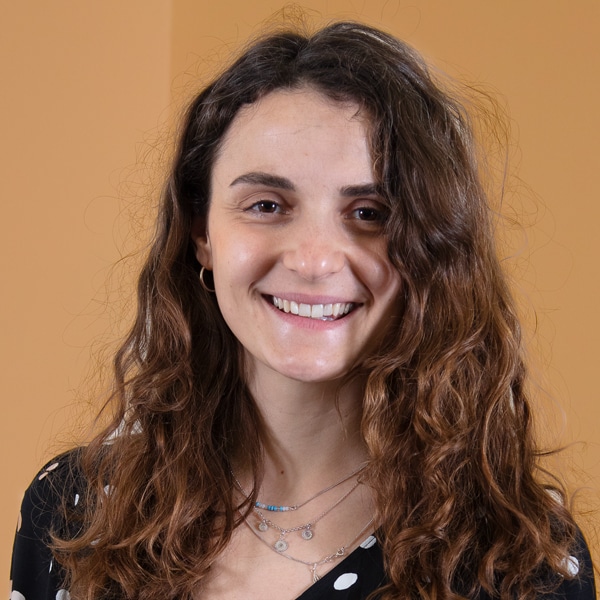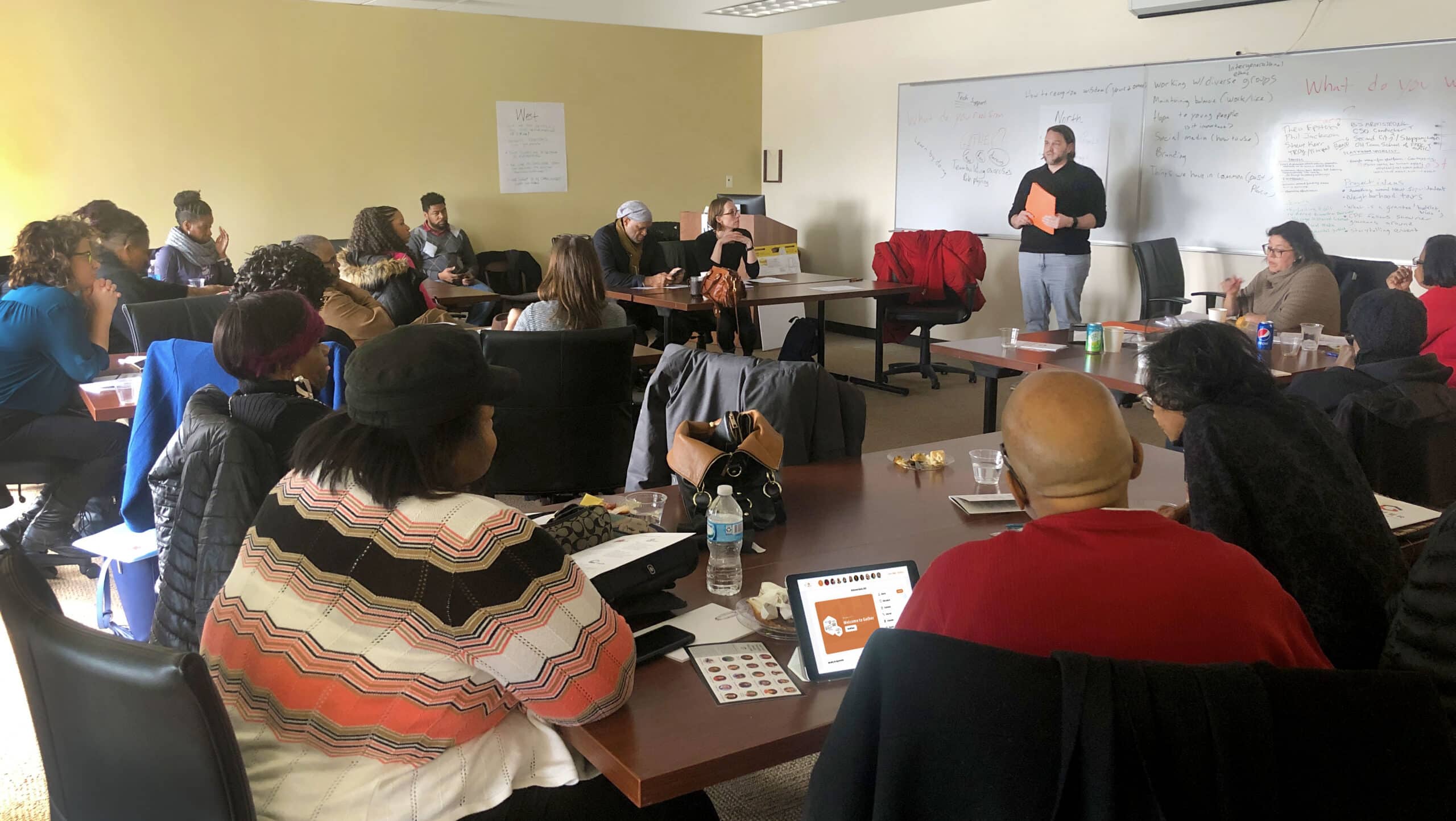How Ibali Lam is Empowering Women Entrepreneurs in South Africa
To mark this year’s International Women’s Day, the UN has chosen the theme of Technology and Innovation for Gender Equality – an area familiar to Dieudonne Allo (Global Fellow from South Africa) who is leading the Ibali Lam program through his organization Global Leading Light Initiatives. Ibali Lam is an exceptional example of empowering women through technology, by providing women entrepreneurs the digital tools and innovative approaches to storytelling to connect with existing and new customers and investors.
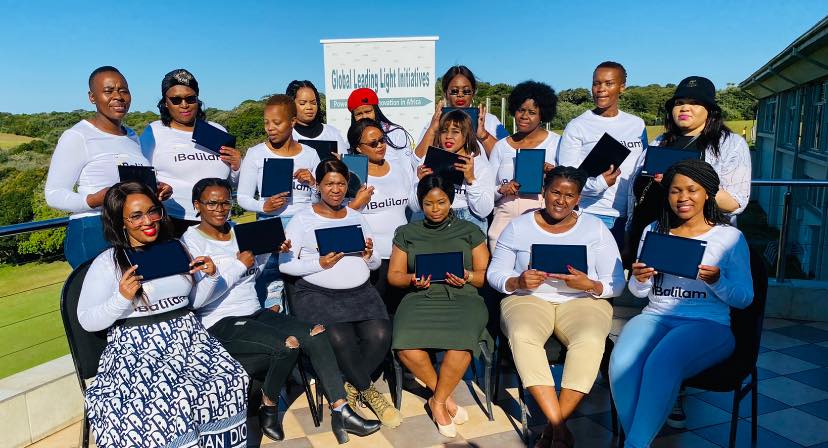
The project uses business storytelling, frugal innovation, investment readiness, and networking to help women whose businesses have been affected by COVID-19 to pivot new online models and engage existing and new audiences. The program also offers weekly roundtable sessions and one-on-one-coaching.
To mark International Women's Day, Global Fellow and CEO of Global Leading Light Initiatives Dieudonne Allo and Program Coordinator at Global Leading Light Initiatives Fatima Momoti share their insights on how their Ibali Lam program is improving women's lives, mainly through economic empowerment.
Marking International Women's Day
Fatima begins by elaborating on how women in today's world cannot interact without technology and storytelling.
“We need to empower ourselves with technology. If we are not going to move with the wave of technology, we will unfortunately get left behind and be stuck in that mentality of a previously disadvantaged group. Women need to be more in the forefront of development and innovation.”
She further elaborates on how the Ibali Lam initiative lifts women to achieve this.
"We are mainly in a rural area, so for these women to have a wider reach increases their income for their business. We come from setups that mainly have four to five people in a house, so having extra revenue means they can feed themselves and their families."
According to Fatima, when women beneficiaries understand what storytelling is they are able to better understand their customers and better craft their business online by using various social media platforms.
"Another component of the program is to ensure that we have a more holistic approach in helping these businesses accelerate and then from there help to set up the business aspect, the digital transformation."
Then, through investment readiness, women are introduced to potential investors.
"Women have been mainly talking to customers, and now it's changing from that to a potential investor. So, they get into that space when they can pitch to investors and get feedback."
This leads to more opportunities and stability for them.
Dieudonne places emphasis on women’s economic empowerment and its core role in the Ibali Lam program and importance for social justice
"Technology is advancing today, and every woman must empower herself to bridge the gap. Technology is a potent tool for women to transform themselves and empower themselves economically, because Ibali Lam is really about economic empowerment" -- Dieudonne Allo, Global Fellow from South Africa.
Gather as an Inspirational Path
Dieudonne highlights that Ibali Lam drew inspiration from the Goldin Institute’s GATHER program.
"The Gather program of Goldin Institute inspired the model of Ibali Lam. Women, especially in this part of the world, do not have access to technology, so we give them access; we provide internet data to them so they can access the online platform. Women get tablets, too.” he says.
Today, Dieudonne adds, one cannot interact without technology.
“Another thing without which you cannot interact is storytelling. For us, as Africans, storytelling is a very vital part of our culture. So, combining storytelling and technology women can connect to people and make them see value in their outputs and businesses.”
Ibali Lam’s Future Projects
Ibali Lam has to date supported 37 women and will continue to support women in other forms too. Concluding our conversation on a positive note, Dieudonne shares that they are working on a new project which will launch soon.
"Working with women, we can equip them with technological tools and their businesses can go online, but if they do not have access to finances, they cannot grow their businesses."
So, to support them, Ibali Lam has developed a new support program that will provide micro-grants for its alum. Follow Ibali Lam's work through their website.
GATHER: For the Margins, not the Masses

DePaul University Professor Lisa Dush recently presented the Goldin Institute’s GATHER program as “A Learning Platform for the Margins, not the Masses,” at an April 1, 2019 "Research Meet and Greet" event for colleagues, members of the university community and special guests.
GATHER is both a curriculum for grassroots organizers and an on-line learning system that was designed by Goldin Institute Executive Director Travis Rejman working with a team of software engineers and advisors. Both the GATHER curriculum and the software were designed in collaboration with the Goldin Institute's network of community leaders in over 50 countries and the design is based on 17 years of experience empowering organizers in some of the world’s most difficult circumstances. As an expert of digital learning as well as a longtime ally of the Goldin Institute’s efforts, Lisa focused on the GATHER software’s genesis and development, analyzing its versatility as well as its potential.
Reviewing GATHER’s history and outlining the program’s future options, Lisa asked,
[quote]“Why were a scrappy group of less than 15 people able to create a learning platform with more novel features than an enterprise learning management system?”[/quote]
Lisa first worked with the Goldin Institute in 2011, teaching a workshop on digital learning and storytelling in Haiti, where Goldin was collaborating with Malya Villard-Appolon, a founder of KOFAVIV (Commission of Women Victims for Victims), to establish security for women in the wake of a massive earthquake that had destroyed the homes and infrastructure for much of the population the previous year. Lisa worked with leaders from five women's rights organizations in Haiti to teach digital storytelling so that they could tell their own stories in their own words using equipment donated by the Goldin Institute.

Lisa discussed the evolution of GATHER from its initial concept and shared the role that faculty and student assistants from DePaul played in the process. Lisa noted that while the Goldin Institute is not a technology-driven organization, but the GATHER team progressed deliberately and brought in professional software developers to help realize the vision. The introduction of Apple’s iPad and other tablet devices in 2010 was a fortuitous development that sparked a "tablet-first" development strategy to make use of a mobile toolkit for community leadership.

After years of testing and development, GATHER was first deployed in the spring of 2018 with an international cohort, and Lisa began an ongoing, intensive research study that includes a study of the behind-the-scenes architecture of the software as well as feedback from users. She documented every step of the way, including the delivery of the specially configured iPads to “all sorts of crazy addresses.”

When it comes to facilitating peer-to-peer learning, GATHER has significant advantages over existing learning management systems, which are designed principally to facilitate teacher-directed learning. Additionally, Lisa noted that enterprise LMSs’ devote significant effort to optimizing their platforms for learning analytics, rather than for student engagement and learning.
About GATHER, Lisa said,
[quote]“First, the platform is designed for a networked, global cohort of learners, so that they can learn together to scale up their work. Overall, you are constantly reminded that you are a community of learners.”[/quote]
Lisa continued, "GATHER’s interface makes the participants visible to each other in ways that are unavailable in other learning programs, while the use of a tablet encourages “walking through the world, engaging with your environment, sharing with your community.”
The GATHER toolkit, moreover, gives participants useful techniques through earned “tools” that can be brought along to real world situations. Lisa cited surveys which showed high satisfaction among the GATHER graduates, who pledged to stay in touch with each other and said that their work already had been positively influenced by the program.

The Goldin Institute is currently engaged in a new GATHER curriculum designed to build the capacity of organizers based in Chicago neighborhoods, the Chicago Peace Fellows, a joint initiative with the Conant Family Foundation.
Jacquelyn Moore, a Peace Fellow with extensive experience in technology and finance who runs robotics programs for young people in the Auburn Gresham neighborhood, said Lisa’s presentation accorded with her experience with the GATHER software thus far. As a new member of the GATHER community of learning, Jacquelyn said she particularly enjoyed getting to know the international alumni of the programming. Jackie shared:
[quote]“Even though the GATHER fellows in Africa are spread out across that continent, we here in Chicago often feel isolated from each other. Through GATHER, I’ve gotten to know people I could talk to.”[/quote]
Learning Together with the Chicago Peace Fellows
After her son Darren was shot to death in 2012, Lisa Daniels was frustrated that media coverage focused exclusively on his criminal record. Her son made bad decisions with consequences he didn’t anticipate, but he was a loving child, father and loyal friend, and Lisa felt strongly that he should be remembered for more than just his worst mistake. She founded the Darren B. Easterling Center for Restorative Justice to help other young men and their mothers in similar situations, beginning her work by showing compassion for the young man who killed him, asking the court for leniency.
“Like each and every one of us, Darren was a flawed human being, created in God's perfect image. Without the Center, his life would have ended in a blaze of gunfire. Now it carries on in an illumination of promise, of hope, of love.” -- Lisa Daniels
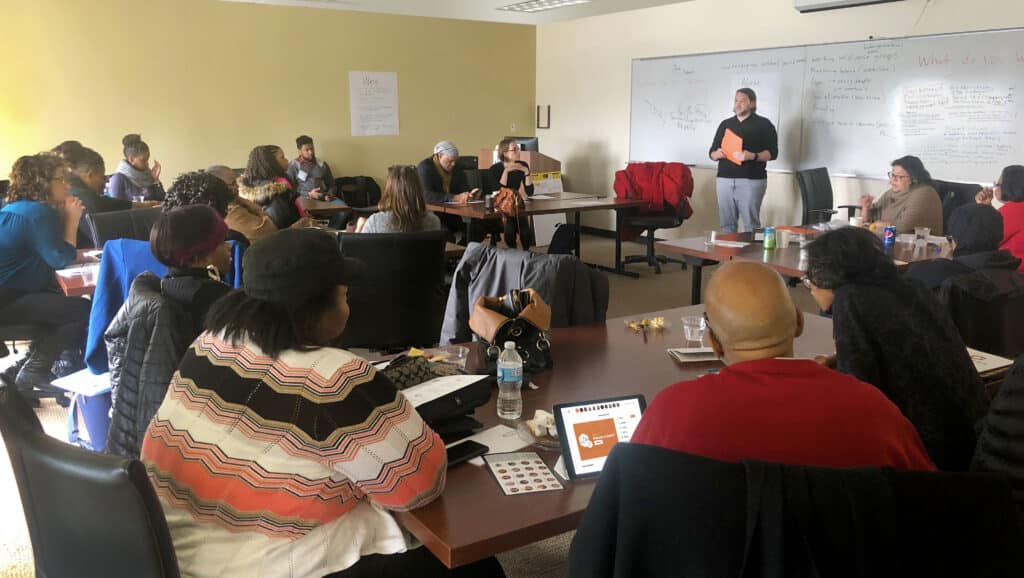
The Goldin Institute recently selected Lisa and 18 other compassionate, resourceful individuals for the first cohort of Peace Fellows in partnership with the Chicago Fund for Safe and Peaceful Communities. In the months ahead this groundbreaking collaboration between the Conant Family Foundation and the Goldin Institute will support neighborhood-level initiatives to build safer and more peaceful communities across the city.
On March 8, Lisa attended the launch event for the Peace Fellows at DePaul University’s downtown campus along with other grassroots leaders. Expressing her hopes and expectations for the Peace Fellows, Lisa said, “Give me all the information I need to do what I need to do.”
Another Peace Fellow, Ken Butler, executive director of the Major Adams Community Committee in the North Lawndale neighborhood, was thrilled to be sharing experiences and best practices as well as pitfalls with other practitioners.
“A lot of the time, when you’re the head of an organization, they won’t tell you it’s bunk. But I really need honest feedback to know I’m on the right track.” -- Ken Butler
Commenting on her first day meeting with the Fellows, Maria Velasquez, executive director of the Telpochcalli Community Education Project in the Little Village neighborhood, worked with other groups. “I’m very structured, but it’s important to be flexible too,” Maria said.
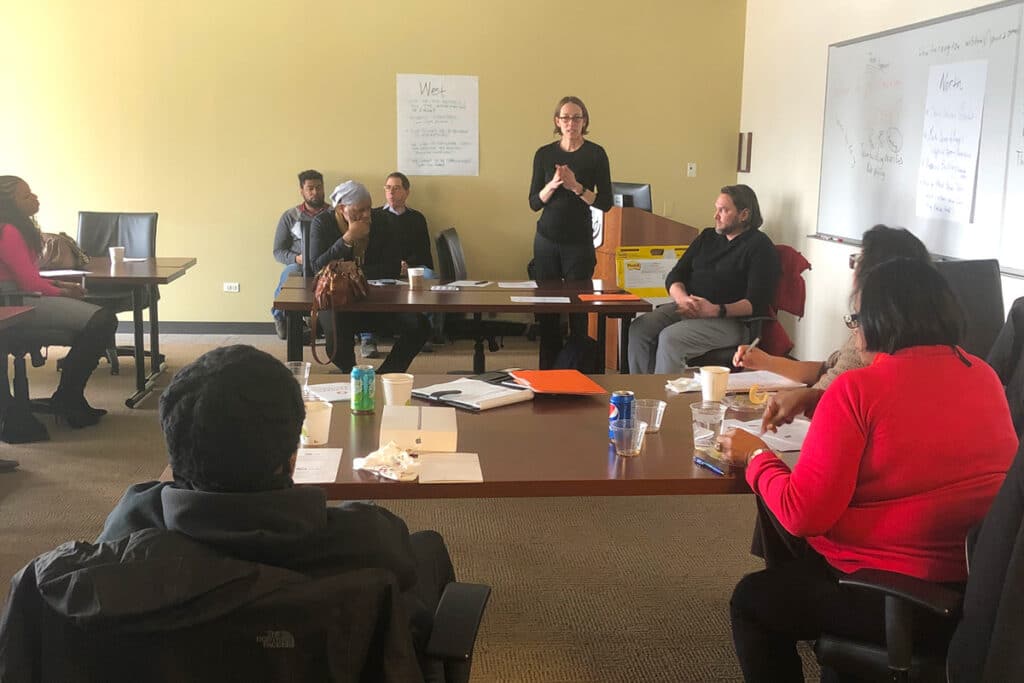
“It’s not enough to train servant leaders unless you train servant structures.” -- John Zeigler
Expressing her enthusiasm for the Peace Fellows’ debut, Leslie Ramyk, executive director of the Conant Family Foundation, added that philanthropies supported grassroots leaders to identify and develop solutions to problems at the neighborhood level.
“When it comes to issues you’re facing in your communities, I’m not the expert,” Leslie said.
“This is about you telling us what’s needed. This is your time, your space. You don’t need to impress anyone, except maybe each other.” -- Leslie Ramyk
In his remarks, Goldin Institute Executive Director Travis Rejman said the Chicago Peace Fellows culminated 17 years of work around the world. In 2002, the Goldin Institute convened dozens of international grassroots leaders and chartered the organization’s mission based on their ideas, challenges and aspirations.
“You are joining a group of people who want to learn together, who are not just in Chicago but around the world. The Peace Fellows initiative is the latest expression of the mission of the Goldin Institute.” -- Travis Rejman
Each Peace Fellow received a stipend and a specially configured iPad loaded with the GATHER curriculum and integrated software. Goldin Institute senior staff created the Peace Fellows curriculum based on our 17 years of experience building the capacity of grassroots organizations around the world, and after extensive discussions with community leaders, scholars, government officials and key figures at area institutions.
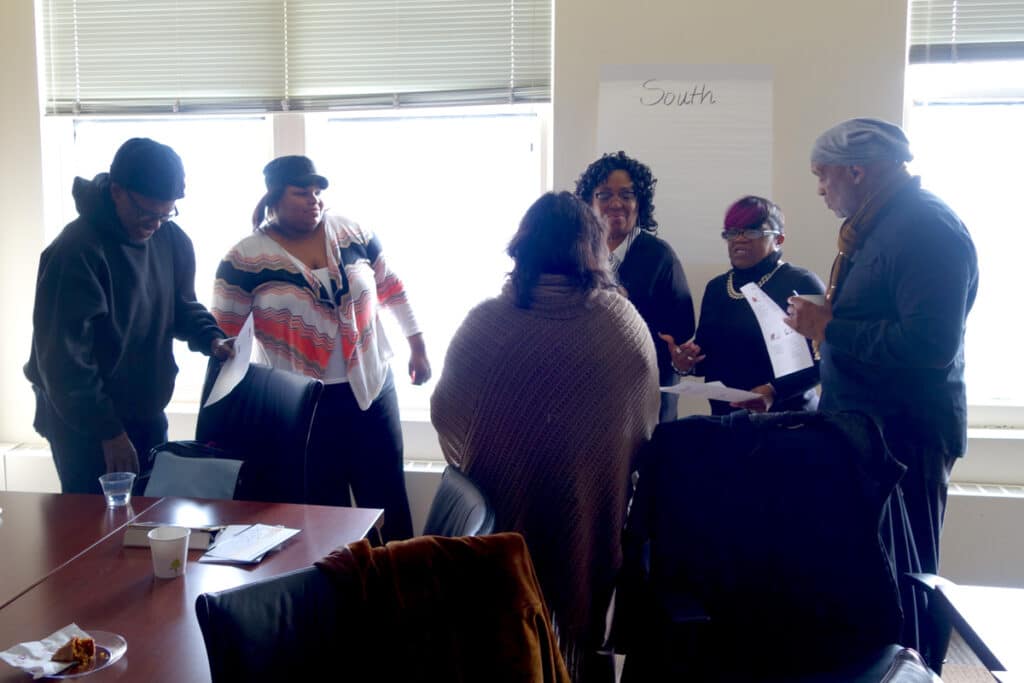
The Fellows are learning cutting-edge concepts such as asset mapping and conflict resolution, conducting site visits to organizations and foundations here in Chicago, and meeting virtually with experts and other community leaders around the world. Most importantly, they are sharing their own hard-earned wisdom based on practical experience as they prepare for the summer, when they will have an opportunity to use the new techniques and concepts they’ve learned in collaborative projects that will be funded by the Chicago Fund for Safe and Peaceful Communities to obviate violence and remediate its consequences.
The Peace Fellows were chosen through an intensive application and interview process drawing from the ranks of previous grantees of the Chicago Fund for Safe and Peaceful Communities, a coalition of 40 foundations that are aligning their investments to support proven and promising approaches to reducing gun violence.
Special thanks to DePaul University for hosting our first in-person meeting and to the generous support from the Conant Family Foundation, Polk Bros. Foundation, Chase Bank and the Chicago Fund for Safe and Peaceful Communities that makes this work possible.
Chicago Peace Fellows Take Shape

The Goldin Institute recently brought together community leaders with key figures at a range of Chicago area civic institutions to gear up for the Chicago Peace Fellows, a joint initiative with the Conant Family Foundation and other philanthropies that will be the first domestic application of the GATHER curriculum and software, our tablet-based, capacity-building program for grassroots community leaders.
After yet another year where violence shattered too many of Chicago’s families, some of the city’s best minds talked over two dinners in December and January how technology, policy and communication can all be tools to empower those who are on the front lines of trying to mitigate, obviate and devise alternatives to terminate the violence. These civic leaders are helping to inform the curriculum that is based on the insights and aspirations of community leaders at the forefront of violence prevention in the city.

In coming weeks, the Goldin Institute will begin an intensive recruitment and application process to select the first class of Peace Fellows who will all be drawn from the grantees of the Chicago Fund for Safe & Peaceful Communities, a special grant opportunity which has drawn together the largest and most prestigious philanthropies in the city.
At the first dinner, Justice Stamps, who runs the Marion Nzinga Stamps Youth Center mentoring program on the Near North Side, expressed concerns about the general relationship in Chicago between community organizations and philanthropies, warning that current strategies were often “a band aid to a much greater problem.”
The voices of youths and young adults who are both the victims and perpetrators of violence are not included sufficiently in conversations about how grants are allocated, she elaborated. While many grants are won by small, grassroots operations, the dollar amounts are modest and these groups remain desperate for financial support. On the other hand, large, well-established non-profit organizations have a significant competitive advantage.
[quote]"We need the funders to get away from cookie cutter funding. We're going to do a block party in August and they are going to get killed in January." - Justice Stamps [/quote]
To remedy these issues, Justice suggested that an umbrella organization provide infrastructure and support to the “people doing the trench work.”

Dan Lurie, senior fellow and director of the Chicago office of the New America Foundation, agreed with Justice about the need to support grassroots operations, adding that while the dollar amounts of grants awarded under the Safe & Peaceful Communities Fund were too small to dramatically reduce the level of violence in the city, a strategic approach could leverage government agencies, in particular, to play a larger role.
[quote]"There needs to be new money, but is there a way to disrupt philanthropy with this kind of fund? A lot of funders would welcome being disrupted.” - Dan Lurie[/quote]
Jose Rico, a political activist and aldermanic candidate, pointed out that the enormous sums spent on criminal justice and incarceration dwarf the amounts spent on education, prevention and alternative activities.
[quote]“We know we are not getting the outcomes we are hoping for.” - Jose Rico[/quote]
Robin Robinson, a longtime Chicago television news anchor who is currently a special adviser to Chicago Police Superintendent Eddie Johnson, added that race and racism must be included in discussions of how to stop the violence in the city.
[quote]“There is a way to talk about race that doesn’t make everyone cringe back." - Robin Robinson[/quote]
At the second dinner in January, participants discussed the role hospitals and research institutions could play as well as how the collateral effects of violence radiate throughout the community.
Daniel Cooper, author of The War on Neighborhoods: Policing, Prison, and Punishment in a Divided City and Director of Research at the Metropolitan Planning Council said that while good research was essential, it had to be shared with the communities who were being researched: “With that data, there is a great deal of responsibility to use it to be uplifting to community members and to be as transparent as possible.
[quote]“We have to make sure we are turning back the power of data to the community organizations that worked with us." - Daniel Cooper [/quote]
Leif Elsmo, executive director of Community and External Affairs at the University of Chicago Hospitals, discussed his institution’s recent experience with opening a trauma center, noting that they had discovered that the emergency room was an opportune location for intervention.
[quote]“People who come into the hospital with gunshot wounds are more likely to be hurt again or to hurt someone themselves." - Leif Elsmo
Ghian Foreman of the Washington Park LLC described the effects of a six-week basketball tournament he organized in the Harold Ickes Homes public housing development more than a decade ago, citing it as an example of the types of programs that can be effective: “It was only 6 weeks, but those 6 weeks were six weeks of peace.”
Nedra Sims Fears, executive director of the Greater Chatham Initiative, noted that the financial burdens of the criminal justice system fall disproportionately on the women who live in the same communities where incidents of crime and violence are highest. She described a neighbor who mortgaged her home to pay for a lawyer representing her son in a criminal case and then explained how her own family spent thousands of dollars to house a nephew who had been released from prison.
[quote]“Black women are the ones paying for this missing generation of Black men. We pay for their absence, for their lost wages, for their criminal defense, and for the revolving door of the justice system. These are not statistics. These are people we know, in our families. This is real. - Nedra Sims Fears [/quote]
Eddie Bocanegra, a senior director at the Heartland Alliance who was both the perpetrator and victim of violence and was incarcerated, said that he grew up in the Little Village neighborhood during the years Chicago suffered more than 1,000 homicides each year, but had a close, loving family who welcomed him back into the fold when he completed his term in the penitentiary.
[quote]“My family was my infrastructure that I could tap into when I got back. Today, what’s it going to take for young people for young people to stop for the amount to think about the direction they are going? Part of it is therapy but mostly it is just relationships.- Eddie Bocanegra [/quote]
Studies Show Microcredit Shortcomings
Six New Studies Point to the Inflated-Promise of Microcredit in Transforming the Lives of the Poor
We just became aware of this report, which compiles comprehensive research critical of the standard microcredit model.
Economist Esther Duflo of the Massachusetts Institute of Technology, a co-founder and co-director of J-PAL, co-author of the India and Morocco studies, and founding editor of the American Economic Journal:
[quote]These loans do help, but the changes are not transformative, certainly not transformative enough to justify charitable donations to the standard microcredit model. We have seen, though, that these are viable profit-making products, and so investors interested in a double-bottom line should take note."[/quote]
- Applied Economics

Duflo suggests researchers and non-profits focus their attention on other approaches for financial inclusion for the poor.
Our own research in Bangladesh, which brought the voices of loan recipients to the table to address the ways in which microcredit often had net negative impact to their communities, mirrors many of the same findings coming to light in the J-PAL and IPA studies.
